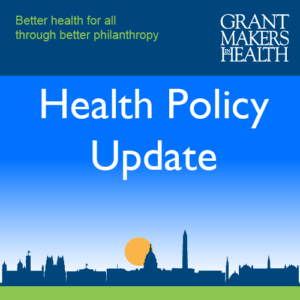Health Policy Update: April 17, 2025
In an effort to help our Funding Partners better understand the changing health policy landscape in the new administration and Congress, Grantmakers In Health (GIH) is expanding the GIH Health Policy Update newsletter to three issues per month. Working in collaboration with Leavitt Partners, a leading health care policy consultancy, we are adding new installments of the newsletter on the first and third Wednesdays of the month, while we will continue to partner with Trust for America’s Health on the installment released on the second Wednesday of the month.
Communicating for Policy Change
Health foundations have traditionally overlooked communications as an essential tool for achieving strategic goals and, instead, have preferred to engage in “FYI” communications such as issuing annual reports, newsletters, and press releases on foundation grants. As this GIH Issue Brief Communicating for Policy Change reports, this attitude has evolved into one where more and more grantmakers recognize the importance of communications in their own work, specifically efforts to influence health policy.
Back to School: Improving Health Literacy to Improve Health
The start of a new school year represents an opportune time to consider how literacy skills can influence both the quality of the health care services people receive and the health outcomes they experience. Health literacy is defined as the ability to “obtain, process, and understand basic health information and services needed to make appropriate health decisions” (Institute of Medicine 2004).
Adolescence to Adulthood: Crossing the Threshold
The period between adolescence and adulthood is a time of great transition. As youth accepts the responsibilities of adulthood, they must take important choices about leaving home, continuing their education, finding a job, or starting a family. Over the past several decades, with more youth entering college and delaying marriage, the transition has become even more complex.
Engaging Employers: Creating Health Care Advocates in the Business Community
Employers provide health insurance coverage to 160 million workers and their dependents, almost two-thirds of the nonelderly population. With health care costs rising, many business leaders are calling for reform. Health philanthropy is experimenting with several ways to engage the business community in conversations about health care reform.
Reducing Gun Violence: Is There a Role for Health Philanthropy?
Every year, approximately 30,000 Americans lose their lives to gun violence. Efforts to reduce this tragic toll raise important questions: How can gun violence be prevented?
“Replication” Local Style: A Philadelphia Story
Adapting a program model that works in one place requires knowing which elements can be modified, which cannot, and how to line up home support.
Join & Become a GIH Funding Partner Today!
Click here to learn more about becoming a GIH Funding Partner and joining the largest national network of health funders.

